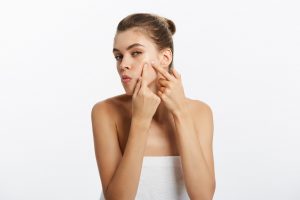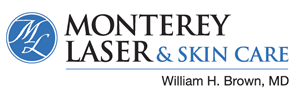Ah, acne. We all get it, and we all hate it. And if you’re someone who suffers from it regularly, chances are you’ve spoken to friends or jumped online to research what could be causing your outbreaks. There definitely has to be a trigger, right? At 13, acne is part of puberty, but what about in your 40s and 50s?
The problem with discussing or researching acne problems is that it’s hard to know what’s a myth and what’s not. For example, we’ve all heard that toothpaste cures acne—but that’s simply not true. How do these myths get started, anyway?
Here are a few acne myths, and a few truths, and what you can do about your own acne issues.
Acne Myth #1: If you have acne, you need to wash your face all the time.
Yes, wash your face…but in moderation. Do it like a normal person, not obsessively like Howard Hughes. And definitely don’t scrub too hard, or you’ll wind up with very irritated skin.
The science: The truth is, washing your face too much can cause it to become extra dry, which can result in even more breakouts. The best thing to do is to wash your face two times a day with mild soap, gentle circle motions, and a nice pat dry.
Acne Myth #2: Makeup causes/aggravates acne.
There is some legitimacy to this myth, but only if you use the wrong type of makeup. Because acne is such a widespread problem, many products now include pimple-fighting benzoyl peroxide or salicylic acid, and can therefore help your skin.
The science: Powder-based mineral foundations that have silica, zinc oxide, and titanium dioxide are particularly great for those who have trouble with acne, as these can absorb the oil that produces pimples.
Acne Myth #3: If you have acne, you need constant treatment.
When we’re experiencing breakouts, it’s hard to stay away from creams, scrubs, masks, and medicines. We want to get rid of those pimples pronto! However, as mentioned before, everything in moderation. Too much “acne medicating” can make things worse.
The science: Almost all acne medications includes benzoyl peroxide and salicylic acid, which can help your skin, but also can cause your skin to dry out if you use them too much. And of course, dried-out skin will result in more acne.
What if Nothing is Working?
If you have serious acne issues and your situation seems to stay the same no matter what medications you use, no matter what makeup you wear, no matter what food you eat, and no matter what regimen you follow, you may want to consider an acne skin treatment from a skin specialist. Whether you want to improve acne, acne scarring, or both, there are plenty of incredible options that can help, including:
- CO2 laser skin resurfacing, which uses concentrated carbon dioxide to reduce acne-damaged skin cells. This treatment is kind of like dermabrasion or a chemical peel, only gentler.
- Botox treatments can help greatly with acne because it has the ability to slow down your skin’s production of oil. Less oil, less acne!
- DermaSweep is a popular treatment which uses fine bristles to improve acne scarring. These bristles gently exfoliate and revitalize the skin, as well as open it up to be healthier.
- IPL, or intense pulsed light photofacials, use intense light pulses to penetrate the skin deeply in order to target acne problems. Not only do IPL treatments reduce acne; they also reduce redness.
There are many options if you’re suffering from stubborn acne and nothing seems to help. If you have any questions about these treatments, please feel free to ask us or schedule a free consultation!
